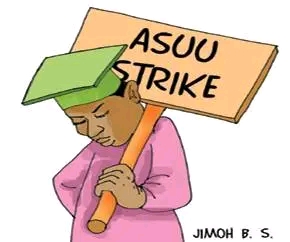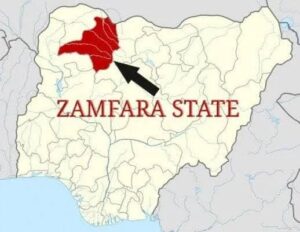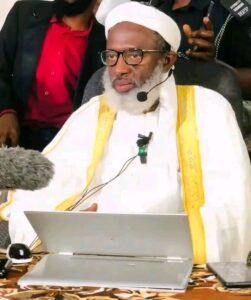
By Prof. Abubakar Mu’azu
The spirited attempts by some officials of the Federal Government of Nigeria (FGN) to ensure that the strike by the Academic Staff Union of Universities (ASUU) fails without signing any agreement as provided in the labour laws for collective bargaining has succeeded through resorting to the courts to achieve the “no agreement signed” objective.
Since this government came into power in 2015, it was very clear that the officials of the government find it unacceptable for ASUU to continue using the , of the labour laws to get the government to continue and sustain funding public universities in Nigeria. They must have come into the government with a decided mission to battle ASUU to a point where, no matter what the consequences may be on the public universities, there will be nothing like FGN-ASUU agreement. To their understanding, the government is a behemoth that should be allowed to run the affairs of the public according to the individual perceptions and understanding of “top government officials.”
From 2015 to date, the officials have done everything humanly possible to frustrate every effort at collective bargaining. First in pretence, the government after ASUU declared a strike demanding for the review of the terms of the 2009 agreement, grudgingly set up its negotiation team headed by Dr. Babalakin, the one-time Pro-Chancellor and Chairman of the Governing Council of the University of Lagos (UniLag). As the Chairman of the government’s negotiation team, he led the discussions towards reaching every point, but never in the direction of reaching mutual resolutions. He was so adept at shifting the discussions away from the goals to the extent that ASUU was forced to demand for his removal.
Characteristic of the posture of the government to assert power, despite the long term effects of the obduracy of playing tough, he was not removed. But he had to resign as the Pro-Chancellor and Chairman of the Governing Council of the University of Lagos when the academics in that institution blocked him from handling one of the matters the way he understood it. It was so bad that the University of Lagos declared Dr. Babalakin as a persona non grata.
The incident in UniLag and the resignation by Dr. Babalakin, handed government officials one other opportunity not to resolve the issues affecting the Nigerian public universities that would have led to the signing of agreement with the government. They delayed the process using Dr. Babalakin’s resignation as an excuse. Then the government later made the former Vice Chancellor of the Nigerian Defence Academy (NDA) and former Executive Secretary of the National Universities Commission (NUC), Professor Emeritus Munzali Jibril, the Chairman of the Negotiation Team. Professor Emeritus Munzali Jibril successfully navigated through the issues and got a draft agreement that would have restored industrial peace in the universities. But it would seem the officials of the government were rather disappointed at what Professor Munzali Jibril had achieved – the successful conclusion of negotiations between the FGN and ASUU. Instead of taking appropriate action to get the document signed or raise any concerns about any aspect in the negotiated document, the officials simply kept the document aside. They did nothing. They hoped, in their warped sense of governance that doing nothing would help them to solve the issues in dispute. So they kept mute.
Then ASUU after patiently waiting for and making several appeals/requests to the government to get the document signed and without dignified with a response decided to mobilise its members to take action. The government since 2020, through the action of its officials, refused to get the document signed. It became very clear that appeals to the honour and good sense of government officials was not working. They were not bothered since by their understanding, no citizen or group should have the audacity to demand that the government obey and operate according to the principles of the law. As far as they are concerned that was “testing the will of the government”, “challenging the government”, “dictating to the government”, “telling the government what to do”, teaching the government how to govern”, etc. Of course, the government officials must have some “technocrats”, “political juggernauts”, “contractors”, “courtiers/sycophants”, etc telling them not to “allow employees to dictate terms to you as officials of the government.” So the document was left to gather dust.
ASUU was patient all these while. The posture of the government was to pretend that no negotiations happened, there was no document to be signed and forget ASUU. But on 14th February, 2022, ASUU went on strike after several appeals and the declaration of a trade dispute that was contemptuously ignored by the officials of the government. Officials of the government falsely claimed that “ASUU suddenly went on strike”, “negotiations were going on, then ASUU went on strike”, “the government was responding to the issues, when ASUU decided to go on strike”, etc. The government officials did not have the honour to tell the Nigerian public that they refused to respond to several letters, appeals, requests for meetings, calls through communiques and press releases, intervention by the Inter-Religious Committee and the declaration of the trade dispute. Their deliberate refusal by the officials to utilise the machinery of the government to respond to the issues affecting the public universities for industrial peace to reign was not an issue to them since, by their belief they can act in any way that they please because “no one can tell the government what to do.”
To further confuse the Nigerian public with a dubious intent for negotiations with ASUU, the government officials reconstituted the negotiation team with Professor Emeritus Nimi Briggs as Chairman. They remembered that there was an already concluded negotiated document and presented it to the Briggs-led Committee as the document for negotiation. In their determined position not to sign any agreement, they brought out that document in the hope that ASUU would refuse to appear before the Briggs-led Committee. But to their dismay ASUU honoured the invitation and held negotiations and reached mutual agreement with the government’s negotiation team.
One would have thought that the issues in the dispute have been addressed leaving room for signatures. Instead, Nigerians saw the Minister of Education, Adamu Adamu, commandeered to Aso Rock and, it would seem was ambushed to read a provocatively prepared speech portraying the government as tough and uncompromising. He read that “negotiations have failed”, “all the issues in the dispute have been addressed”, “the government has met 80% of ASUU’s demands”, but only the issue of withheld salaries remained. The Minister of Education read that “students should sue ASUU”.
This angered ASUU members as the officials of the government, who see the issues in the dispute as a political game to crush the union not to resolve the issues in the larger interest of Nigeria, refuse to recognise the timelines for the extension of the strike to give the government time to resolve the issues and the dishonest claim that the negotiations had failed, gave the National Executive Council (NEC) through Congress Resolutions, to declare comprehensive strike. The officials of the government saw that their less than honest handling of the strike was not working and they decided to go to the National Industrial Court with the fiction that negotiations have failed and requested for an interlocutory injunction to order ASUU to call off the strike. The initial deception by the officials of the government was that they were going for arbitration. Instead, what they actually demanded was an interlocutory injunction to force ASUU members back to work without resolving any of the issues in dispute. The government got its injunction, peculiarly with ASUU present in court. The government script was granted.
Then ASUU decided to go to the Court of Appeal hoping to quash the interlocutory injunction. But the Court of Appeal while upholding the right of ASUU to appeal granted ASUU a conditional ruling in its favour. The Court was ready to entertain the appeal but only after complying with the order of the lower court within seven days before entertaining the appeal of the union. In other words since ASUU was sentenced to death by hanging by the lower court, the union should be hanged first then it can appeal thereafter. As matters stand, ASUU has complied with this unsatisfactory order of the court. The officials of the government may have achieved their aim of “no signing agreements with ASUU.” But nothing has been resolved; nothing has changed.
The officials of the government may be celebrating their presumed success in unnecessarily and irresponsibly keeping public university students at home for eight months without resolving any of the issues that led to the strike. I hope they can celebrate this as an achievement as they have failed deliberately to use the available legal process for collective bargaining.
They have succeeded in awakening university lecturers to the reality that it is unhealthy to take on more the defined responsibilities in the university system to keep the universities going. Instead, each lecturer should take and teach the officially defined number of courses and supervise the defined number of final year students. The University Governing Councils and Management should, in the interest of the students, employ the staff required to teach the courses that have no lecturers and supervise the remaining students that have no supervisors. This will be in the best interest if lecturers as they do not have to over-stretch themselves. It will be good for their individual health.
The way things are all lecturers need to resist the practice of going on visiting lectureship so that they can concentrate on their primary areas of work. All the universities are going to survive without visiting. It is a very important message that has come from the position of government. If any university cannot survive without visiting lecturers, it is not the problem of ASUU. One of the demands of the union is to stop the proliferation of the universities. Any federal, state or private university that cannot function without relying on visiting lecturers should simply close shop. The unnecessary sacrifice and stress on the health of academics need to stop. Your families – parents, wives, children and relations – need you in good health.
All lecturers need to sustain the drive for quality graduates in the Nigerian university system. One of the reasons for going on strike is to ensure that standards are not compromised and students receive the best training to enable them to confidently compete with graduates from any part of the world on equal intellectual footing. The quality of graduates must meet the global standard since a university with a local standard is never a university. All required practical sessions in the Sciences, Engineering, Agriculture, Mass Communication, Theatre Arts, Architecture, Fine Arts, Geography, etc, all laboratory, studio, workshop and theatre, must not taught through “alternative to practicals”. All the required equipment, facilities and reagents must be provided without compromising any session. The University Governing Councils and Management will get all these from the government.
The universities need to rigorously admit students based on the carrying capacity designed for each institution. There should be no over admission. Let every candidate be admitted from the JAMB pool without interference. Universities need only operate based on their carrying capacity. Where the government thinks that there is the need for expansion or creation of new universities, let it make the necessary arrangements: build the required classrooms, lecture halls, theatres, laboratories, studios, theatres, hostels; employ the required staff, provide all teaching materials. ASUU needs to continue to insist on this.
No discipline is self-compatrmentalised and needs to be supported by other disciplines in teaching. So where a department requires the services of an expert from a related department, the money for such service must be available to pay the lecturer. This should also apply to the teaching of subsidiary/elective courses. If there is no money to pay the lecturers, the no teaching. It is good to borrow a leaf from the government. Accumulating arrears for work done without payment is not allowed by law and is repugnant to justice. Pay the worker his/her due.
The accreditation exercise needs to be more credible. No academic should accept any compromises from any university on this. Let it be a transparent and an honest process. This will help the government to deploy resources to ensure that all programmes have the required materials for quality undergraduate and graduate training. Where any officials want to compromise on the process, academic staff on such assignment need to expose this. No compromises to “arrangee accreditation” that only helps to compromise standards of quality. The Council will get the funds for this from the government.
Please think of more options. Sense can be cultivated into government by standing firm. But the challenge is getting all our colleagues to agree to the suggestions and implement them. Government must be responsive and responsible. No government officials will act in the best interest of Nigeria without being forced to do so. Failure to hold government accountable will result in the imposition of dictatorship, irresponsible behaviours by government officials and privatisation of the government. Public Nigerian universities must not be allowed to die as desired by some characters in government. Nothing has changed. But change has to be fought for to build a better university education system for Nigeria. The struggle is not over. There is no giving up! Keep the fire of the struggle burning until victory.
Prof. Abubakar Mu’azu Department of Mass Communication, University of Maiduguri.


